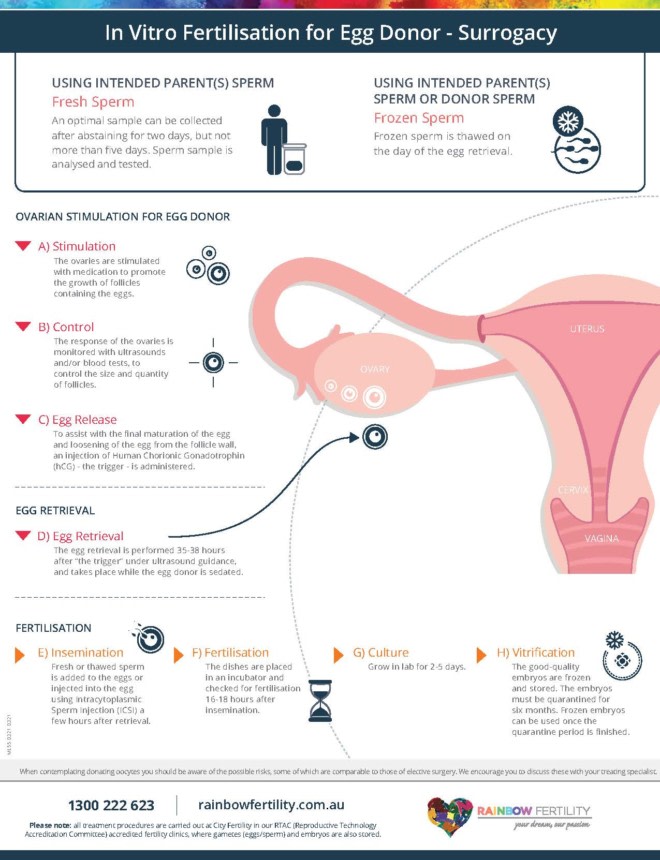In Vitro Fertilisation for Egg Donor (Surrogacy)
In Vitro Fertilisation (IVF) literally means “fertilisation in glass”. It involves the fertilisation of a donor egg by the sperm of the intended parent in an incubator outside the body and the transfer of the embryo into the uterus of the surrogate. In the case of infertility that cannot be successfully treated, donor sperm may be needed to conceive.
Before treatment can begin, egg donors are asked to meet with the specialist to ensure they are medically suitable, and a fertility coordinator will talk to them about the type of treatment required, the risks of the procedure, lifestyle recommendations and other requirements such as counselling sessions. If approved, they’ll then be prepared to undergo an IVF cycle, after which the eggs will be retrieved.
Illustrated Guide
Please click on the image below to view in full and download our infographic.

The IVF for Egg Donor treatment cycle generally follows these stages:
- Once the egg donor is selected and the compulsory requirements have been completed, the donor is prepared for IVF.
- Follicle growth and egg maturation: this process takes about 8-10 days of daily hormone injections.
- Egg collection: once the eggs are mature they are retrieved. This procedure is performed by the treating specialist under general anaesthetic or light sedation.
- Fertilisation: the donor eggs are then fertilised with sperm from the intended parent, to create the embryos.
- Culture: culturing of the embryos for 2-5 days.
- Vitrification: the good-quality embryos are frozen and stored.
- Quarantine period: the embryos must be quarantined for three months. At the end of the quarantine period, the egg donor and the intended parent(s) are contacted to return for final screening tests to allow clearance of the embryos for use. The embryos can only be used with the surrogate if the results of all the screening tests are negative. This ensures that none of the infectious agents that are tested can be passed on to the surrogate. At all times the health and safety of our donors, surrogate and recipients are our primary concern.
When contemplating fertility treatment you should be aware of the possible risks, some of which are comparable to those of elective surgery. We encourage you to discuss these with your treating specialist.
PLEASE NOTE:
- As of 4th June 2020, people wishing to have assisted reproductive treatment in Victoria are no longer required to undergo a criminal records check and child protection order check. For further information please visit our page Legislative Requirements – Victoria.
- All treatment procedures are carried out in our RTAC (Reproductive Technology Accreditation Committee) accredited fertility clinics, where gametes (eggs/sperm) and embryos are also stored.
At Rainbow Fertility, our specialists have extensive experience in helping create LGBTQ+ families. Feel free to contact our friendly team to learn more about the fertility treatment options available to you.